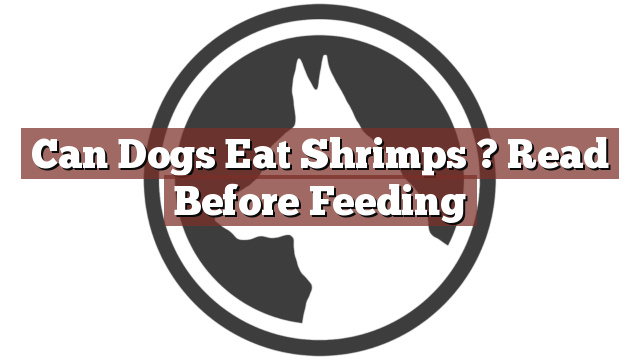Understanding Your Dog’s Dietary Needs
As a responsible pet owner, it is crucial to be aware of your furry friend’s dietary needs. A well-balanced and nutritious diet is essential for a dog’s overall health and well-being. Dogs primarily require a diet rich in protein, fats, carbohydrates, vitamins, and minerals. While it’s tempting to share our meals with our canine companions, it is important to note that not all human foods are safe for dogs to consume. Therefore, it is essential to do thorough research before introducing any new food into their diet.
Can Dogs Eat Shrimps? Read Before Feeding
Can dogs eat shrimps? This is a question that often arises among dog owners. Shrimps are a popular seafood item enjoyed by many people around the world. However, when it comes to our canine companions, caution should be exercised. The answer to the question is yes, but with certain limitations and precautions.
Shrimps are a good source of protein, low in calories, and contain essential nutrients like omega-3 fatty acids, vitamin B12, and selenium. However, before feeding shrimps to your dog, there are a few important factors to consider.
Pros and Cons of Feeding Shrimps to Dogs
Feeding shrimps to your dog can have both pros and cons. On the positive side, shrimps provide a lean source of protein, which is beneficial for muscle development and repair. They also contain omega-3 fatty acids that promote a healthy coat and skin. Additionally, shrimps can be a great alternative protein source for dogs with allergies to more common proteins like chicken or beef.
However, there are several potential downsides to feeding shrimps to your dog. Shrimps, when not properly prepared, may carry harmful bacteria or parasites that could cause digestive issues or food poisoning. Moreover, some dogs may be allergic to shellfish, including shrimps, which can lead to unpleasant symptoms such as itching, gastrointestinal upset, or even difficulty breathing.
It is crucial to introduce shrimps to your dog’s diet gradually and in small portions. Monitor their reaction closely and if any adverse symptoms occur, consult your veterinarian immediately.
In Conclusion: Considerations for Feeding Shrimps to Your Dog
Can dogs eat shrimps? The answer is yes, but with caution. Before feeding shrimps to your dog, it is important to ensure that they are properly cooked and free from any seasonings or additives that may be harmful to dogs. Additionally, it is advisable to remove the shells and tails, as they can pose a choking hazard or cause intestinal blockage. Always start with small portions and monitor your dog closely for any adverse reactions.
Remember, each dog is unique, and what may be safe for one dog may not be suitable for another. If you have any concerns or doubts about introducing shrimps or any other food into your dog’s diet, consult with your veterinarian for professional advice tailored to your pet’s specific needs. By being informed and cautious, you can ensure that your furry friend stays healthy and happy.
Thank you for taking the time to read through our exploration of [page_title]. As every dog lover knows, our furry friends have unique dietary needs and responses, often varying from one canine to another. This is why it's paramount to approach any changes in their diet with caution and knowledge.
Before introducing any new treats or making alterations to your dog's diet based on our insights, it's crucial to consult with a veterinarian about [page_title]. Their expertise ensures that the choices you make are well-suited to your particular pet's health and well-being.
Even seemingly harmless foods can sometimes lead to allergic reactions or digestive issues, which is why monitoring your dog after introducing any new food item is essential.
The content provided here on [page_title] is crafted with care, thorough research, and a genuine love for dogs. Nevertheless, it serves as a general guideline and should not be considered a substitute for professional veterinary advice.
Always prioritize the expert insights of your veterinarian, and remember that the health and happiness of your furry companion come first.
May your journey with your pet continue to be filled with joy, love, and safe culinary adventures. Happy reading, and even happier snacking for your canine friend!

